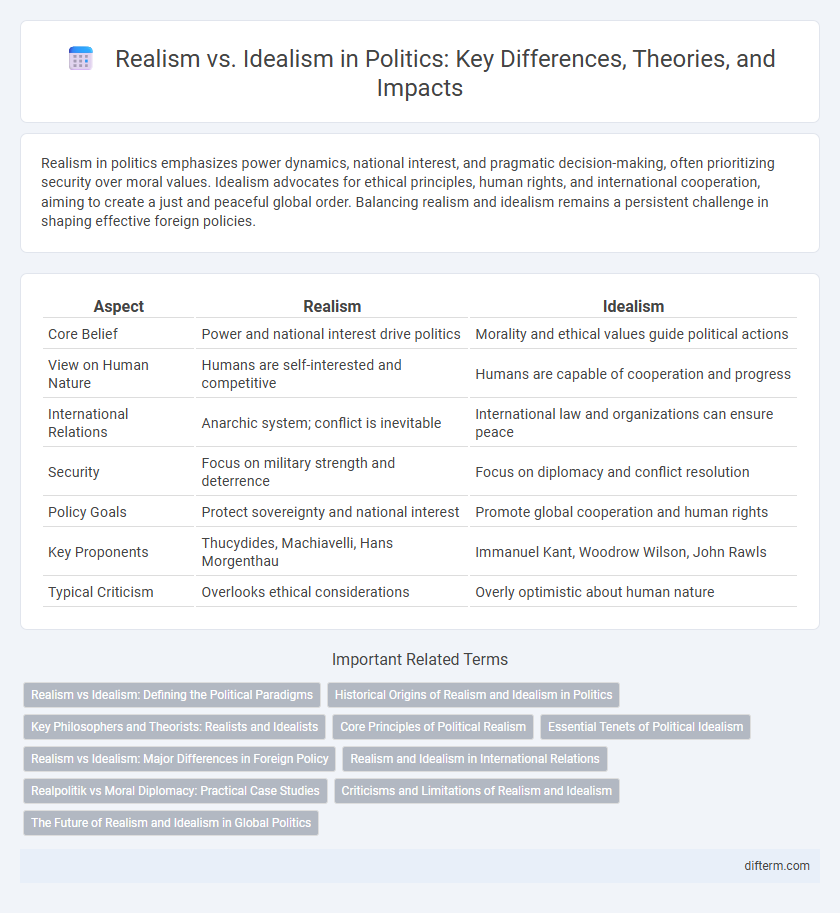Realism in politics emphasizes power dynamics, national interest, and pragmatic decision-making, often prioritizing security over moral values. Idealism advocates for ethical principles, human rights, and international cooperation, aiming to create a just and peaceful global order. Balancing realism and idealism remains a persistent challenge in shaping effective foreign policies.
Table of Comparison
| Aspect | Realism | Idealism |
|---|---|---|
| Core Belief | Power and national interest drive politics | Morality and ethical values guide political actions |
| View on Human Nature | Humans are self-interested and competitive | Humans are capable of cooperation and progress |
| International Relations | Anarchic system; conflict is inevitable | International law and organizations can ensure peace |
| Security | Focus on military strength and deterrence | Focus on diplomacy and conflict resolution |
| Policy Goals | Protect sovereignty and national interest | Promote global cooperation and human rights |
| Key Proponents | Thucydides, Machiavelli, Hans Morgenthau | Immanuel Kant, Woodrow Wilson, John Rawls |
| Typical Criticism | Overlooks ethical considerations | Overly optimistic about human nature |
Realism vs Idealism: Defining the Political Paradigms
Realism in politics emphasizes state sovereignty, power balances, and the pursuit of national interests, asserting that the international system is anarchic and conflict is inevitable. Idealism prioritizes moral values, international cooperation, and the promotion of human rights to achieve global peace and justice. The clash between realism and idealism shapes diplomatic strategies, foreign policies, and the interpretation of international relations theory.
Historical Origins of Realism and Idealism in Politics
Realism in politics originated from the works of Thucydides, Machiavelli, and Hobbes, emphasizing power, state interest, and the inherent anarchy of the international system. Idealism traces back to Enlightenment thinkers such as Kant and Locke, who advocated for moral principles, international cooperation, and the promotion of human rights. These historical origins shape the ongoing debate between pragmatic statecraft and ethical governance in global politics.
Key Philosophers and Theorists: Realists and Idealists
Realism in political theory, championed by thinkers like Thomas Hobbes and Hans Morgenthau, emphasizes power, national interest, and the anarchic nature of international relations. Idealists, including Immanuel Kant and Woodrow Wilson, advocate for cooperation, moral principles, and the promotion of international institutions to achieve peace. The ongoing debate shapes diplomatic strategies and foreign policies worldwide, highlighting the tension between pragmatic statecraft and aspirational global governance.
Core Principles of Political Realism
Core principles of political realism emphasize power as the central factor in international relations, prioritizing national interest and security above moral or ideological considerations. Realism asserts that states act rationally to maximize their power within an anarchic global system, where conflicts and competition are inevitable. It rejects utopian visions, focusing instead on pragmatic and strategic decision-making grounded in actual capabilities and geopolitical realities.
Essential Tenets of Political Idealism
Political idealism emphasizes the pursuit of ethical principles such as justice, human rights, and equality within international relations. It advocates for cooperation through institutions like the United Nations and promotes diplomacy over conflict to achieve global peace. The core tenets center on the belief that moral values should guide state behavior, transcending mere power struggles.
Realism vs Idealism: Major Differences in Foreign Policy
Realism in foreign policy prioritizes national interest, power, and security, emphasizing pragmatic and strategic decision-making based on the anarchic nature of the international system. Idealism, by contrast, stresses the importance of ethical values, international cooperation, and the promotion of human rights and democracy. The major difference lies in Realism's focus on state-centric objectives and power politics, whereas Idealism advocates for moral principles and global governance to guide diplomacy and conflict resolution.
Realism and Idealism in International Relations
Realism in international relations emphasizes state sovereignty, power politics, and national interest as the driving forces behind global interactions, often highlighting conflict and competition among states. Idealism, conversely, promotes international cooperation, moral values, and global governance institutions to achieve peace and collective security. The debate between realism and idealism shapes foreign policy strategies by balancing pragmatic power considerations with aspirational goals for a just international order.
Realpolitik vs Moral Diplomacy: Practical Case Studies
Realpolitik emphasizes pragmatic, power-centered statecraft exemplified by Otto von Bismarck's unification of Germany through strategic alliances and military strength, prioritizing national interest over ideological concerns. In contrast, Moral Diplomacy, championed by Woodrow Wilson, seeks to promote ethical standards and democratic values abroad, as seen in U.S. interventions during the Mexican Revolution aimed at supporting democratic governments. Case studies reveal that Realpolitik often achieves immediate geopolitical gains, while Moral Diplomacy faces challenges reconciling idealistic goals with complex international realities.
Criticisms and Limitations of Realism and Idealism
Realism faces criticism for its often cynical view of international relations, neglecting the role of ethical considerations and cooperation. Idealism is limited by its overly optimistic assumptions about human nature and the efficacy of international institutions, sometimes underestimating power struggles. Both paradigms struggle to fully address complex global challenges such as climate change and humanitarian crises.
The Future of Realism and Idealism in Global Politics
Realism in global politics emphasizes power dynamics, national interests, and security, maintaining relevance amid shifting international alliances and emerging threats like cyber warfare and climate change. Idealism advocates for cooperation, human rights, and international institutions, influencing global governance through organizations such as the United Nations and the International Criminal Court. The future of global politics likely involves a hybrid approach where pragmatic realism balances with idealistic goals to address complex transnational challenges effectively.
realism vs idealism Infographic

 difterm.com
difterm.com